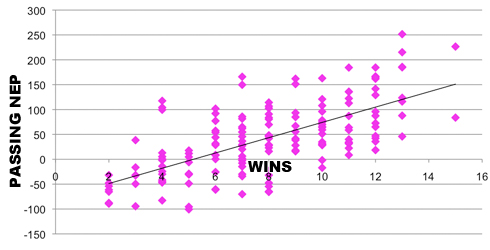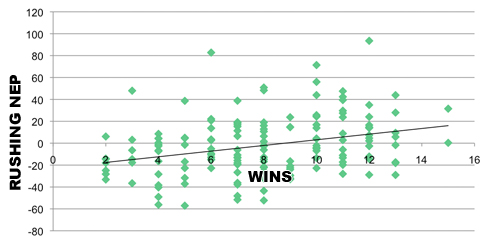Dak Prescott, Not Ezekiel Elliott, Is the Cowboys' Most Valuable Player Thus Far

Ezekiel Elliott is taking over the NFL. And the Cowboys are 8-1 because of it.
That, to a lot of football fans, is the narrative. The Cowboys are the best team in football -- not just by record, but by our own metrics, too -- because Ezekiel Elliott is this generation's, I don't know, any historically great running back we've ever seen.
Using the most basic logic, this notion actually makes a lot of sense. Dallas was 4-12 last year, and they used the fourth overall pick in 2016's draft on Elliott. They've now lost just once in nine games, so credit is going to go to the person who looks to be the true x-factor: Ezekiel Elliott.
As one of those crazy math people who said Zeke was a bad selection for Dallas -- not because he wouldn't be great, but because running backs aren't important enough to warrant that high of a pick in today's NFL -- you may not be shocked when I tell you, "Not so fast!"
It's not just Zeke. And it's not just that offensive line.
The Dallas Cowboys are so good this year because of their quarterback -- a quarterback who actually deserves more credit than Elliott does.
The Zeke Machine
Let me begin by saying something that desperately needs to be said: this is not an analysis of why I think I was right from the beginning, or why backers of the Elliott selection on draft day were wrong. We need to move past that. My goal here is to give an analytical perspective on something that's become incredibly interesting in the football world.
And I have to admit, the Elliott selection isn't as bad as it could have been. For 31 NFL teams, it wouldn't have made sense. Perhaps for the Cowboys, it did. (Insert Internet trolls telling me that this is why I'm not a general manager.)
The Cowboys have run the football better than any team in the NFL this year. That's no surprise. By our Net Expected Points (NEP) metric -- which helps measure the number of real, actual points a team or player adds above or below expectation -- Dallas' 46.05 schedule-adjusted Rushing NEP is a little less than 5 points better than the Bills'. In other words, across the season with everything else being equal, we'd expect a Bills rushing attack to swing nine completed football games by five total points.
Specifically, Ezekiel Elliott has captured 23.67 Rushing Net Expected Points, good for a ridiculous 0.12 per-rush average. That's actually still second in the NFL to Jay Ajayi, but given Elliott's workload and the fact that he's done it for a longer stretch of time this year, we can safely say Elliott has been the most effective back in the NFL this season.
| Player | Rushing NEP |
|---|---|
| Jay Ajayi | 27.00 |
| Ezekiel Elliott | 23.67 |
| LeSean McCoy | 14.87 |
| Jeremy Hill | 14.75 |
| DeMarco Murray | 13.81 |
There are some important things to note with any expected points model, including NEP. You see, NEP isn't swayed by whether or not a play was a pass or a run. As a result, passing is almost always more efficient than rushing. A team is generally going to be better at passing the ball than running the ball, assuming you're comparing passing to rushing and not passing to passing.
For example, we know quarterbacks gain, say, six-plus yards per attempt. That's more impressive, from a pure yardage standpoint, than a running back gaining five yards per rush. But we know that a signal-caller with that type of yards per attempt average isn't good, while a running back with that yards per carry average is spectacular.
So within the context of the running back position, yes, Ezekiel Elliott is more than killing it. For each rush, he's adding roughly 0.14 points -- his Rushing NEP per rush is 0.12, but the league average for a running back is actually negative, around -0.02 -- for the Cowboys above a league-average runner.
But being the best within a position shouldn't make a player the most valuable. If that were the case, where's the love for Dan Bailey?
To highlight this idea, I'll share the same graphs I used in the original article on Zeke, which is linked above. Over the last five years, take a look at how passing efficiency compared to wins versus rushing efficiency.


Throwing the football effectively has correlated twice as strongly to wins in the NFL over the last five seasons compared to running the ball effectively. Yes, I get it: when you run the ball well, you can throw the ball well. That also works the opposite way, though, too: when you throw the ball well, you can run the ball well. How do you think Tom Brady's Patriots have managed to make free agent running backs so relevant over the last decade and a half?
Let's just assume both things work together equally -- that throwing the ball well helps a rushing attack be more effective, just as much as an effective ground game helps a passing attack. Then why, even with this reason, isn't Dak Prescott getting as much love as Elliott is?
Dak Attack
The one thing I can't show with math in this article is what the general population thinks. We're playing under the assumption here that Ezekiel Elliott is getting more love than Dak Prescott is, but maybe that's wrong. Maybe they're getting equal love. Regardless, Prescott's season should still be looked at as being more vital to the Cowboys' success than Elliott's.
First, I've already explained and showed why passing is more important to football than rushing. That alone should tell you that the quarterback position is more important than the running back position. And, to be honest, I'm not sure anyone would argue that.
So, hypothetically, if the difference between Dak Prescott and a league average quarterback is larger than Elliott and a league average running back, wouldn't we conclude that Prescott is more important to his team's offense? You know, since we know quarterbacks are more important in football?
Well, take a look at Dak's Net Expected Points numbers this year compared to the top-five quarterbacks.
| Player | Passing NEP | Per Drop Back |
|---|---|---|
| Matt Ryan | 128.45 | 0.35 |
| Drew Brees | 116.07 | 0.30 |
| Dak Prescott | 103.05 | 0.35 |
| Kirk Cousins | 94.02 | 0.26 |
| Tom Brady | 89.28 | 0.51 |
Oh, Dak's actually a part of the top-five quarterback data set? Yes. Yes he is. Because Dak Prescott is having the most unbelievable passing season we've ever seen from a rookie quarterback.
On the year, only Tom Brady has been better from a Passing NEP per drop back standpoint. And only Matt Ryan and Drew Brees have totaled more cumulative Passing Net Expected Points, thanks to dropping back to pass 80-plus more times.
Prescott's 0.35 Passing NEP per drop back is 0.22 points better than this year's 0.13 average. In other words, he's adding 0.22 more points than a league average quarterback would be adding. Remember, Ezekiel Elliott's number here was 0.14.
And it's not just our Net Expected Points metric that sees Prescott having a historically great season. One statistic that has shown to correlate strongest to winning football games is Adjusted Net Yards per Attempt, or ANY/A, which puts weights on touchdowns, interceptions, and yards lost from sacks. This season, Prescott trails only the aforementioned Matt Ryan and Tom Brady within the statistic. In fact, his 8.35 ANY/A is easily the highest recorded by a rookie in NFL history.
| Player | Year | ANY/A |
|---|---|---|
| Dak Prescott | 2016 | 8.35 |
| Marc Bulger | 2002 | 7.67 |
| Robert Griffin | 2012 | 7.47 |
| Dan Marino | 1983 | 7.39 |
| Matt Ryan | 2008 | 7.01 |
So while everyone's talking about Ezekiel Elliott potentially breaking all of these rookie running back records, we're witnessing a first-year quarterback who's far outpacing any other rookie passer within arguably the most important statistic within the most important position in football.
We're not just "potentially" witnessing history from a running back. We are witnessing history from a quarterback.
It's a Team Effort, But Dak Is the Man
The narrative will be the narrative. Fantasy football drives the NFL-watching world, and Ezekiel Elliott was the prized possession entering the 2016 season, not Dak Prescott. Confirmation bias is at play here. And, hey, I can't blame people for thinking how they're thinking: as an analytical nerd -- one who would never (and still would never) back a first-round running back selection -- even I can admit to Elliott being a necessary piece to this Cowboys' run.
But it's not as though Dak Prescott is playing average football at the most vital position in the sport. Prescott is throwing at an elite, historic level. And considering what we talked through above -- considering the fact that passing is just inherently more important to the game of football -- I'm not sure how, at this point in the season, we're not easily handing this imaginary Cowboys MVP award to Dak.
Or the offensive line, but we know that's not how these things work.
















